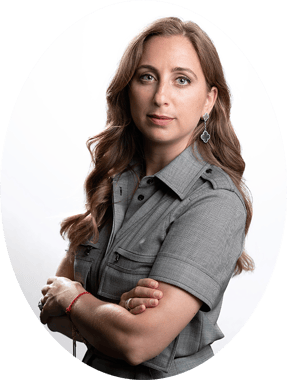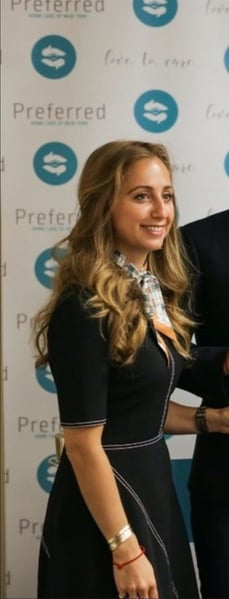Showcasing: Raizy Weiss, COO, Preferred Home Care of New York
“No matter what issues come my way, I stay true to my vision and I see it through.”

There are more than 18 million health care workers in the United States; 80% of them are women, according to the Bureau of Labor Statistics.
While women make up the vast majority of home health care workers, they are a minority in the C-Suite. Only 40% of the industry’s key decision-makers are female.
Home care is a tough space to succeed in, and while org charts may not reflect it, this industry is loaded with strong, determined women doing incredibly meaningful work — they simply don’t get the recognition they deserve!
Here at HHAeXchange, we’d like to take one small step towards changing that. ‘Extraordinary Women in Home Care’ is a series of feature articles designed to celebrate women who bring strength, passion, and creativity to their roles in the home care industry.
We recently spoke with Raizy Weiss, COO of Preferred Home Care of New York. Founded in 2007, Preferred is one of New York’s largest home care agencies, serving over 8,000 patients. Raizy tells us all about how she was able to grow her business, what keeps her focused, and why she wants women to speak up.
What brought you to the home care industry?
I was home with a 1-year-old, and it was time to go back to work. An opportunity presented itself to my husband and I to start a business in home care, and the service aspect of it really piqued my interest. Being able to provide caring and compassionate services to people in the comfort of their homes seemed like an ideal fit for us.
I had some experience with home care through my grandmother. My grandmother was alone for many years. She was a Holocaust survivor and did not like being alone. Throughout my childhood, my family members and I would take turns sleeping at her house so that she would not be alone all the time. My family also hired a caregiver to sleep at her house so that someone could always be there with her. This experience helped me understand at a young age how important it is for people to have someone to care for them.
For my husband Berry, it was always about being able to provide jobs for people. He wanted to help people pay their bills and put food on the table for their families. With my passion for helping people and his passion for providing jobs, we agreed — let’s do it!
Our first branch was in Queens, and then we moved into Brooklyn, and we’ve always serviced the five boroughs. Since then we have added on Westchester, Nassau, Suffolk, Orange, Rockland, and additional counties in upstate New York. And just two years ago, we expanded to South Florida.
Did you have any prior experience growing a business?
I had worked for a large real estate company. They were constantly expanding and growing, and I helped them grow. Since it was such a rapidly growing company, I learned how to adapt and expand on the operational end of things.
The skills I learned in growing a business served me well when we started Preferred Home Care. A few years ago, I saw an opportunity for a separate but related business that could successfully provide services for individuals who could pay privately for home care services. Today Preferred Gold is a successful part of Preferred Home Care.
What is your biggest lesson learned from early on in your career?
I learned how important it is to stand by my vision, stand by my mission, and never lose focus. No matter what issues come my way, I stay true to my vision and I see it through.
What sets Preferred apart from other home care agencies?
For me, it has always been about having smart, innovative people on our team to help us grow and be successful. We leave no stone unturned when it comes to care for our patients. We make the effort to truly understand what they are going through and what their needs are. No matter what, our team will strive to staff a case with an aide that is the best possible match for the patient. With the relationships that we have built over the years, we are able to truly advocate for our patients and get them the care they need.
 Despite the fact that 80% of health care workers are female, women are a minority in the C-suite. How do you feel about this?
Despite the fact that 80% of health care workers are female, women are a minority in the C-suite. How do you feel about this?
As a business owner, I try to encourage the women in my company and inspire them. It is important for me to show them that they can succeed, despite any hardships, and that I am there to support them.
I want to make sure every woman in my organization feels like they have a voice, and that their suggestions are heard. If I say, “No,” debate with me on it. Don’t just say “OK” and walk away with your head down. Tell me why you think differently. Fight with your voice.
Why do you think some women are afraid to speak up?
I think there’s an intimidation factor. They do not want to feel like someone will think that they are failing, or not smart enough or good enough. That is the inner struggle that most of us go through in life, especially women. I try to push that we are all on an equal playing field. If anything, we’re smarter! It’s tough to break through that barrier.
Your business is in New York, the epicenter of the U.S. coronavirus outbreak. How are you dealing with the uncertainty COVID-19 is bringing to your day-to-day work, and to the industry as a whole?
The frail and the elderly need us now more than ever. We made the decision early on that we will accept COVID-19 positive patients and that our caregivers had to be properly trained and have the proper equipment. We found willing and dedicated caregivers, and we really doubled down on all the precautions. I hope that people see the dedication of home care professionals and the incredible resilience of this industry and of New York. We have been through a lot as a state this year and we have come out stronger.
Do you see technology as a tool that can help your business adapt during this time?
Communication is always key, and when you can’t talk face-to-face, you talk through technology. We are using technology to bring education, training, equipment, and comfort to our caregivers and to our patients. Technology is really the only way to be there for each other especially in these times of COVID-19.
What do you find most rewarding about your work?
I appreciate that we can be there as an agency in a time of absolutely great need for someone; that is what I set out to do when I started this business. Continuing to do that every day is rewarding.
Inspiring other women to work towards higher positions is also a rewarding part of my work. With that being said, they need to possess two important qualities: patience and desire. Patience is key, because the higher your position, the more responsibility you have. If you’re not able to understand the scope of those responsibilities and take them on, it’s difficult. You need to take the time to be patient, to learn, and to grow as a leader.
On really tough days, what keeps you going strong?
I just keep in mind that I got this far, and there is so much more I still want do. Responsibility is my motto. Responsibility is at the core of who I am. I am not only responsible for my immediate family, but I am also responsible for my Preferred family of 8,000 patients, 8,000 caregivers, and more than 500 admin employees. I need to do it for them.
How do you get it all done?
When I’m doing one thing, I’m fully focused on it. When I walk into the office I can be there and I am fully present. I have to multitask, but I do it strategically. I want to be able to make sure that everyone and everything gets their time, their say and the attention that they need and deserve.
Were you always such a responsible person?
Yes! I’m the oldest of five. I was always there to take care of everybody. I still am!
In your role as COO at Preferred, what’s the biggest change you’d like to make or goal you’d like to accomplish this year?
The challenge is to be innovative in the way we provide continuing education to home health aides. We want them to grow as individuals, for the advancement of their careers, the benefits of the care they will be able provide, and their experience with our agency. We are providing them with a platform that will enable them to be more hands-on in their work and provide them with the information they will need in one easily accessible place.
Home care agencies today face a number of challenges, with employee retention being one of them. What’s your approach to handling these challenges?
We’re doing the best that we can, and we will always strive to do more. An MLTC recently nominated 10 of our aides that have done exceptional work in the last year with our patients. Along with the MLTC, we honored these aides with a Zoom celebration. This recognition is a slow shift, but it’s starting to happen, and the aides absolutely deserve it.
The entire home care industry is in this together. From early on, Preferred has been there for other agencies, big and small. Some may call it friendly competition. We started with this idea that we can be friends and help each other, and there’s enough business for everybody. It is great to be able to see all of us paying it forward now…agencies being there for each other, advocating for each other and their patients. I do see this trend continuing.



